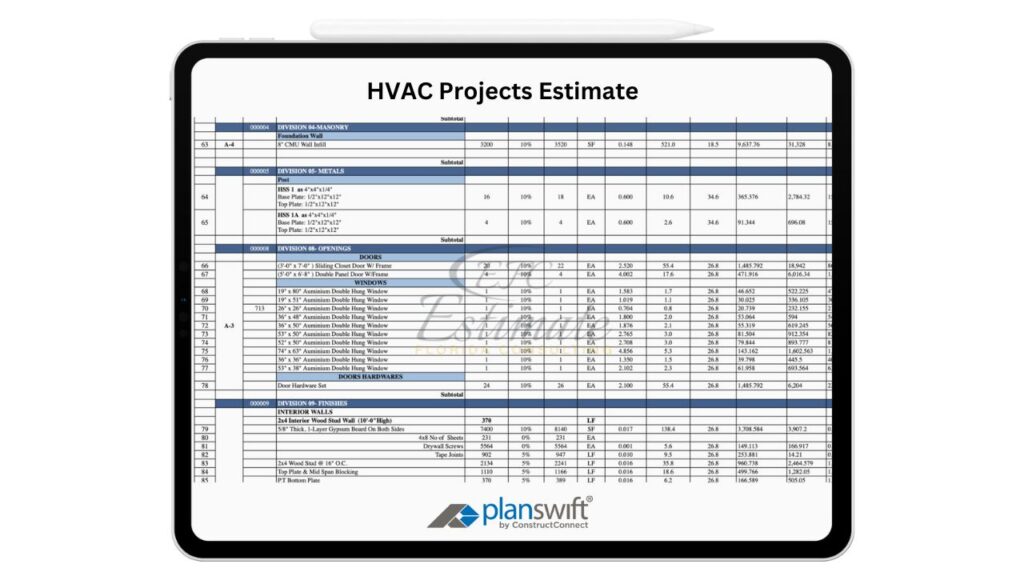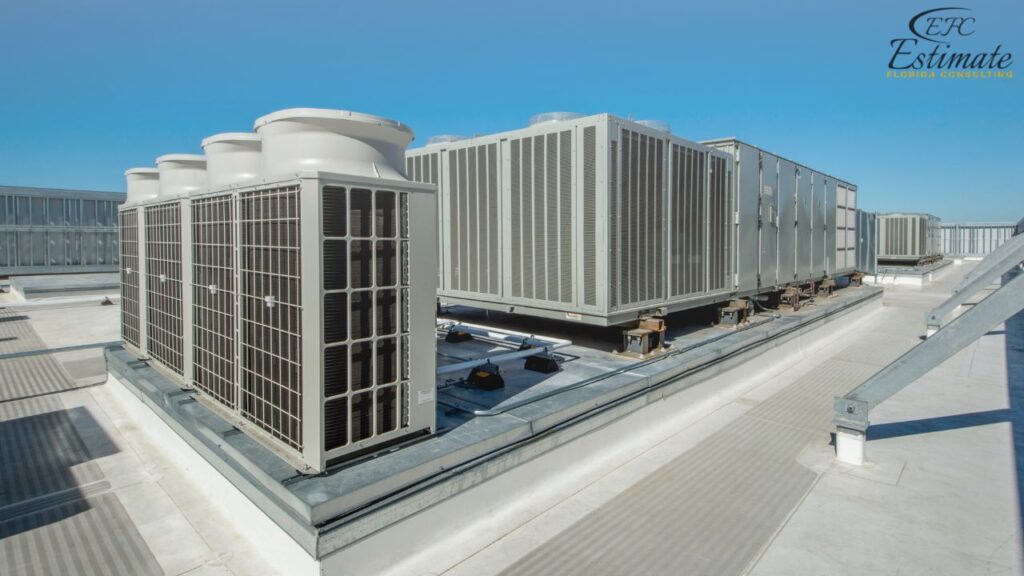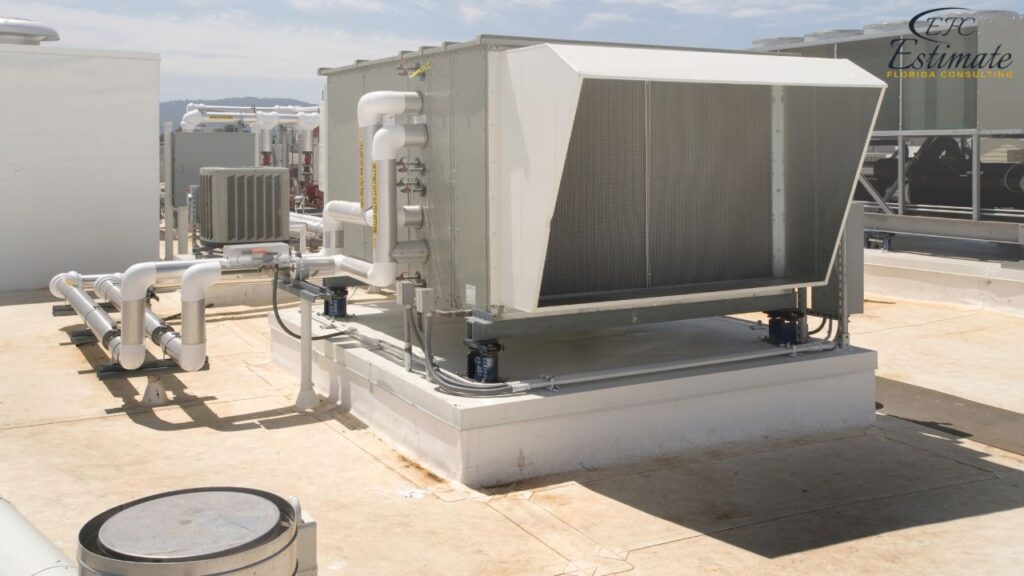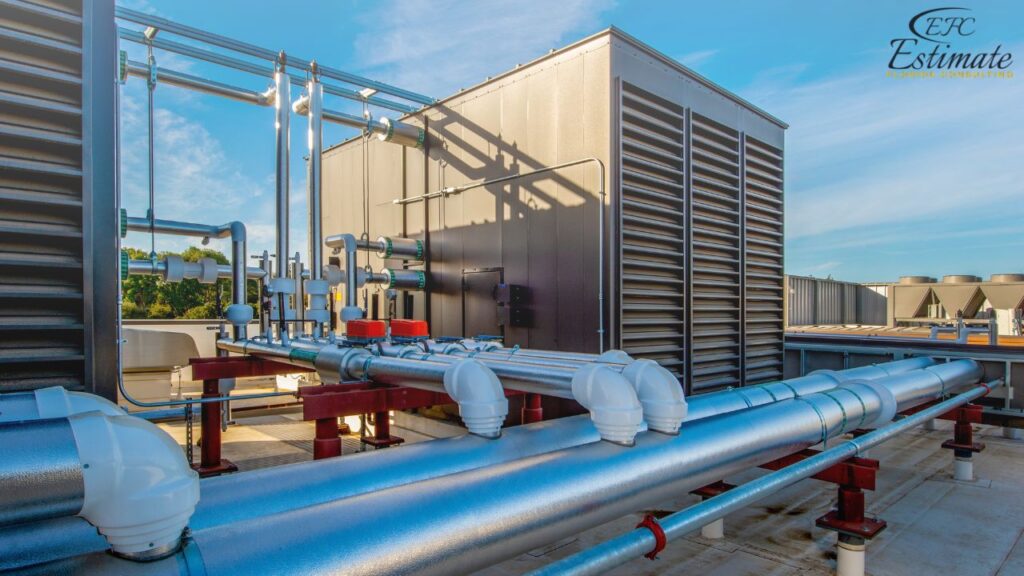90% More Chances to Win Projects With Our Estimate!
- Multi-Family Building
- Hotel Building
- Hospital Building
- Warehouse Building
- School & University Building
- High-Rise Building
- Shopping Complex
- Data Center Building

The cost to install an HVAC system can fluctuate significantly based on various factors such as system type, size, and specific installation requirements. On average, homeowners can expect to pay between $6.50 to $15.60 per square foot for a complete HVAC installation. This price typically includes both materials and labor. Several influencing factors include the complexity of the installation, the location’s accessibility, and the prevailing local labor rates. For instance, homes that require extensive ductwork or system modifications may see higher installation costs due to increased labor and materials.

HVAC System Type | Average Cost per Square Foot |
Central Air Conditioning | $6.50 – $13.00 |
Ductless Mini-Split System | $9.00 – $15.60 |
Heat Pump System | $10.40 – $19.50 |
Replacing an outdated HVAC system can represent a substantial investment, but it is often essential for ensuring improved efficiency, safety, and comfort. The average replacement costs for an HVAC system typically range from $5,200 to $15,600, depending on various factors such as the system’s size, type, and the complexity of the installation. Homeowners should also consider that investing in modern, energy-efficient models, while potentially more expensive upfront, often results in reduced energy bills over time and may come with additional benefits such as rebates or incentives for choosing environmentally friendly options.
Properly installed ductwork is essential for the efficient operation of any HVAC system, ensuring that conditioned air is distributed evenly throughout the home. The cost of ductwork installation usually falls between $1,300 and $6,500, depending on the size of the home and the complexity of the duct layout. Custom ductwork designed for unique spaces or homes with multiple levels may incur additional costs due to the need for more materials and labor. Ensuring that ductwork is properly sealed and insulated can prevent energy loss and enhance system efficiency.
Ductwork Type | Average Cost |
Standard Duct Installation | $1,300 – $3,900 |
Custom Duct Installation | $4,000 – $6,500 |
Routine maintenance and timely repairs are vital for keeping an HVAC system running smoothly and efficiently. Average repair costs typically range from $200 to $800 per service call, depending on the nature and extent of the problem. Common repairs may include replacing malfunctioning thermostats, fixing refrigerant leaks, servicing motors, or addressing issues with ductwork. Homeowners should remember that investing in regular maintenance can help prevent unexpected breakdowns, prolong the lifespan of the system, and improve energy efficiency.
Energy-efficient HVAC systems might come with higher upfront costs, generally ranging from $5,200 to $18,500 for installation. However, these systems provide long-term savings through reduced energy bills and potential tax credits or rebates. In Florida’s climate, choosing a system with a high SEER (Seasonal Energy Efficiency Ratio) rating is particularly beneficial, as a higher SEER indicates better energy efficiency. While the initial investment may be significant, homeowners often see a return on investment through lower monthly utility costs and increased home value.
Energy-Efficient System | Average Cost |
High-Efficiency Central AC | $5,200 – $12,800 |
Energy Star Heat Pump | $8,500 – $15,600 |
Regular maintenance is crucial for ensuring the optimal performance and longevity of HVAC systems. Routine check-ups generally cost between $130 and $400 per visit, depending on the services included. Homeowners may also consider annual maintenance contracts for comprehensive coverage, typically ranging from $250 to $780 annually. These contracts often include seasonal check-ups, priority service, and discounts on repairs. Investing in regular maintenance helps identify and resolve minor issues before they become major problems, saving money in the long run.
Maintenance Service | Average Cost |
Single Maintenance Visit | $130 – $250 |
Annual Maintenance Contract | $250 – $780 |
Incorporating smart technology into HVAC systems not only enhances convenience but can also improve energy efficiency. Costs for smart thermostats range from $130 to $390, while the installation of complete smart HVAC systems can range from $3,900 to $13,000.
These systems allow homeowners to control heating and cooling remotely, set schedules, and monitor energy usage through mobile applications, leading to improved comfort and potentially lower energy costs.

Smart HVAC Technology | Average Cost |
Smart Thermostat | $130 – $390 |
Complete Smart HVAC System | $3,900 – $13,000 |
Geothermal HVAC systems utilize the earth’s constant temperature to heat and cool homes efficiently and sustainably. The installation costs for these systems can range from $19,500 to $39,000, but the long-term energy savings often justify the investment. Geothermal systems are particularly well-suited for Florida’s climate, providing year-round comfort with minimal environmental impact. While the upfront cost is higher than traditional systems, the energy savings and environmental benefits can be substantial over time.
Geothermal System | Average Cost |
Closed-Loop System | $19,500 – $31,500 |
Open-Loop System | $22,000 – $39,000 |
Understanding the various types of HVAC systems available is crucial for homeowners looking to make informed decisions. Each system type has its own cost implications and benefits.

Central air conditioning systems are commonly used in larger homes, providing efficient cooling through a network of ducts. The average installation cost for these systems ranges from $5,200 to $12,800. While central AC systems require ductwork, they offer consistent cooling throughout the home.
Ductless mini-split systems are ideal for homes without existing ductwork or for room additions. Installation costs range from $4,500 to $13,000, depending on the number of zones and system capacity. These systems provide flexible zoning options and can be more energy-efficient than traditional ducted systems.
Heat pumps serve dual purposes by providing both heating and cooling. The average installation costs typically range from $5,200 to $15,600, depending on the model and installation complexity. Heat pumps are particularly effective in moderate climates and can help reduce overall energy costs.
Understanding HVAC system efficiency ratings is essential for selecting systems that offer optimal performance and energy savings. The two main efficiency metrics to consider are:
Selecting a system with high efficiency ratings may entail higher upfront costs, but the long-term savings can be substantial, making it a wise investment.

Upgrading to a modern HVAC system offers numerous advantages beyond mere comfort. New systems are designed to be more energy-efficient, which translates to lower utility bills and a reduced carbon footprint. Improved indoor air quality is another significant benefit, as newer systems are equipped with advanced filtration technologies that help reduce allergens and pollutants. Furthermore, many modern HVAC systems come with smart technology capabilities, allowing homeowners to monitor and adjust settings remotely, thereby maximizing efficiency.

Many homeowners mistakenly believe that larger HVAC systems will always provide better cooling or heating. In reality, oversized systems can lead to increased energy costs and discomfort due to short cycling, where the system turns on and off frequently without adequately conditioning the air.
Another common misconception is that regular maintenance is not necessary for HVAC systems. In fact, routine maintenance is crucial for ensuring the longevity and efficiency of HVAC systems. Neglecting maintenance can lead to costly repairs and reduced energy efficiency.
While it may be tempting to assume that higher-priced systems automatically provide superior performance, this is not always the case. Homeowners should focus on the system’s efficiency ratings, warranty options, and reviews rather than solely on price.
Investing in a reliable and efficient HVAC system is essential for achieving comfort and sustainability in any home. By understanding the costs associated with installation, maintenance, and repairs, homeowners can make informed decisions that meet their specific needs. Whether upgrading to an energy-efficient system or considering a geothermal option, it’s crucial to evaluate all available choices. Additionally, regular maintenance and timely repairs can help ensure that HVAC systems operate optimally, delivering comfort year-round while minimizing energy consumption. This guide serves as a valuable resource for estimating HVAC project costs, ensuring that homeowners, contractors, and developers can navigate the complexities of HVAC projects with confidence.
Estimating HVAC projects involves assessing various factors such as the type of HVAC system, size requirements, and installation complexity. Begin by determining the square footage of the area that requires heating or cooling. Next, research the average cost per square foot for different HVAC systems, which typically ranges from $6.50 to $15.60 depending on the system type and installation requirements. Consider additional costs for ductwork, energy efficiency upgrades, and specific installation needs to arrive at a comprehensive estimate.
To calculate an HVAC estimate, first determine the square footage of the area to be serviced. Multiply this area by the average cost per square foot for the desired HVAC system type. For instance, if you opt for central air conditioning with an average cost of $6.50 to $13.00 per square foot, your estimate would be calculated as follows:
Estimate=Square Footage×Cost per Square Foot
Don't forget to include additional factors such as ductwork installation (typically between $1,300 and $6,500) and any required maintenance or repairs.
For a 1000 sq ft area, the cost to install a new HVAC system can vary based on the type of system chosen. Here’s a rough estimate based on average costs:
This means you can expect to pay between $6,500 and $19,500 for a new HVAC system in a 1000 sq ft home, depending on the system type and installation specifics.
For a 2000 square foot space, a general rule of thumb is to allocate 1 ton of HVAC capacity for every 600 to 800 square feet. This means you would need approximately 2.5 to 3.3 tons of HVAC capacity for a 2000 sq ft area. Consult with a professional HVAC contractor for precise calculations based on your home’s layout, insulation, and climate factors.
A 2-ton HVAC unit can effectively cool a house between 1200 to 1600 square feet, making it a suitable choice for a 1500 sq ft home. However, factors such as insulation quality, ceiling height, and local climate may affect its efficiency. It’s advisable to have a professional assessment for optimal sizing.
For a 2500 square foot house, you will typically need an HVAC system with a capacity of about 3.5 to 4 tons. This calculation is based on the general guideline of 1 ton per 600 to 800 square feet. Consulting with an HVAC expert will ensure the right sizing, taking into account insulation, local climate, and home design.
Yes, a 3-ton air conditioning unit can adequately cool a 2000 square-foot house. This size is within the typical cooling capacity range for that area, allowing for efficient performance, assuming other factors like insulation and airflow are well managed.
A 3-ton AC unit is generally suitable for cooling approximately 1800 to 2400 square feet. This range can vary based on home design, insulation quality, and climate conditions, so a professional assessment is recommended for precise cooling requirements.
A 3-ton AC unit is slightly oversized for a 1500 square-foot house. While it may cool the space effectively, it can lead to short cycling, where the system frequently turns on and off, resulting in higher energy costs and less efficient humidity control. A 2-ton unit would be more appropriate for optimal performance and comfort in a space of this size.
At Estimate Florida Consulting, we offer detailed cost estimates across all major trades, ensuring no part of your project is overlooked. From the foundation to the finishing touches, our trade-specific estimates provide you with a complete and accurate breakdown of costs for any type of construction project.

We take pride in delivering accurate, timely, and reliable estimates that help contractors and builders win more projects. Our clients consistently praise our attention to detail, fast turnaround times, and the positive impact our estimates have on their businesses.
Estimate Florida Consulting has helped us win more bids with their fast and accurate estimates. We trust them for every project!

Submit your project plans, blueprints, or relevant documents through our online form or via email.
We’ll review your project details and send you a quote based on your scope and requirements.
Confirm the details and finalize any adjustments to ensure the estimate meets your project needs.
Receive your detailed, trade-specific estimate within 1-2 business days, ready for your project execution.

561-530-2845
info@estimatorflorida.com
Address
5245 Wiles Rd Apt 3-102 St. Pete Beach, FL 33073 United States
561-530-2845
info@estimatorflorida.com
Address
5245 Wiles Rd Apt 3-102 St. Pete Beach, FL 33073 United States
All copyright © Reserved | Designed By V Marketing Media | Disclaimer